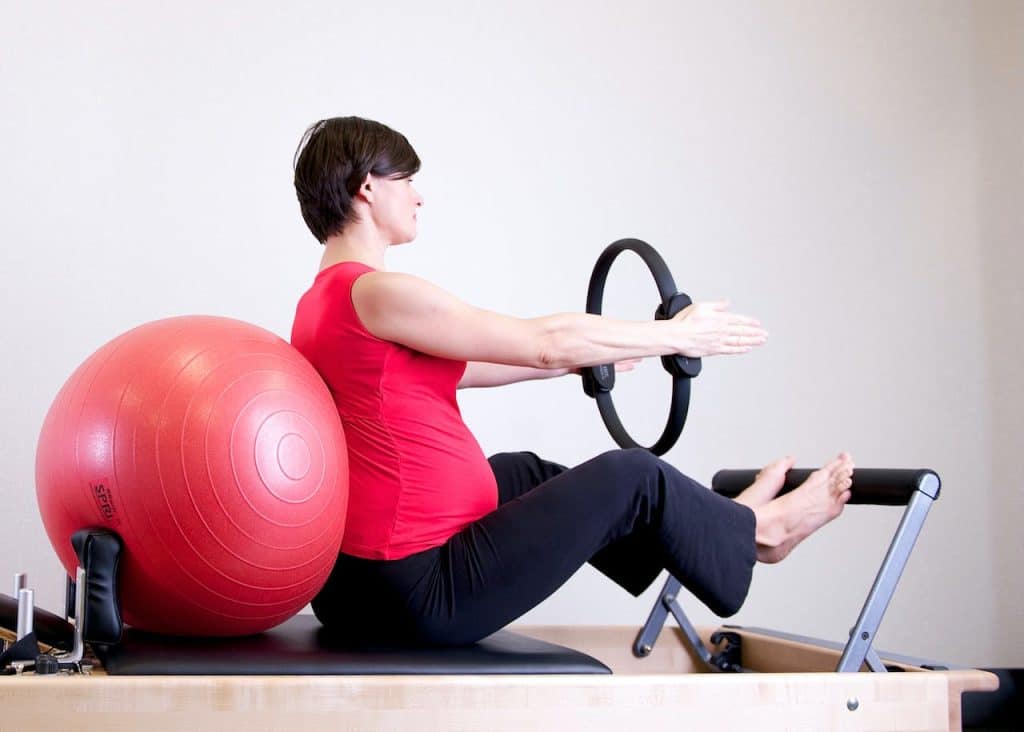What a ride. Whether you are at the beginning or deep in growing your baby, you know what I mean under “The Ride”. It is just wild how quickly feelings can shift in our body, mind, and soul. I had the luck to go through this journey with my two daughters.
My pregnancies were just the most unique, peaceful, messy, and transformative period of my life, mainly because they are like twins – with 18 months between them.
Do Not Compare Yourself to Others
I can tell you that no one says the same about their experiences of their pregnancy, especially on weight gain. Nevertheless, there are standards that we can look at. Let’s do this, knowing that everyone starts from a different starting point.
Standards are Guidelines
In the first trimester, you may gain only 0,5-2,5 kilos or no weight at all. It’s ideal to gain 0,25 – 0,5 kilos per week in the second and third trimesters [1].

Why Does it Matter To Stay On Track with Your Weight?
As always, the golden mean is essential here. If the overall weight gain is too small, it can cause premature birth or low birth weight. If it is too much, there is a chance of gestational diabetes and blood pressure issues [2].
Fortunately, many apps now help us follow up, and they usually also give helpful advice on maintaining optimal weight gain. The baby’s weight does not grow evenly in the belly either; yours can jump spectacularly in the 3rd trimester. The whole process works with the natural rhythm: you might gain one week more, the other week less.
What Influences Weight Gain During Pregnancy?

Genetic, hormonal, emotional/psychological factors are all in the game! What does this mean in practice? Nothing is set in stone! Anno, my mother gained 32 kilos with me, and I gained 11-13 kilos with my children.
Of course, 30 years have passed, and today, we are more conscious about our bodies, food choices, and everything around the baby.
But of course, there’s also the age at which you give birth, how many children you’re expecting, and whether you had any health issues before pregnancy. What kind of lifestyle you lead, even your education counts according to the law of large numbers [3]!
Embrace the Change; It’s Gonna be Massive
When I became pregnant for the first time, I imagined pregnancy and birth as we can see the transformation of a Sailor Moon once they are in the act. You can guess, it’s not it. It is just shaking from head to toe. To become someone’s mom is unrepeatable and irreversible.
For me, the changes in my body seemed to be small due to the series of emotional and mental changes that the birth, feeding, supervision, and care of my baby meant. I had no time and energy to worry about the physical changes. I think the fact that my body can create, grow, and give birth, then feed and carry the baby, is just amazing, without me consciously realizing.
Have Sustainable, Balanced Eating Habits
“Eating for two” is something our mother and grandmother would say when it comes to eating during pregnancy. Now we know it’s not about the quantity but the quality of the food. Of course, there are two (or more) persons now whose needs are equally important at the same time.
Building a healthy and sustainable routine is crucial. Giving yourself five meals a day of veggies and fruits, seeds, meat, eggs, and whole grains will do their part. Specific nutrients, like folic acid, iron, etc., are essential in the different stages of these nine months [4]. Healthy food choices will help optimal weight gain.
Stay Active, Get on Your Feet

Walking, dancing, or stationary cycling? All are safe during pregnancy and postpartum [5]. At least 150 minutes of moderate physical activity spread throughout the week [6], and you can put a tick on your to-do list.
Among other things, you can maintain your physical well-being and decrease the chance of cesarean birth and postpartum recovery time [7]. It also helps to prevent postpartum depression[8] and maintain optimal weight combined with healthy eating habits. All the pros work for you and for your baby, too.
Stay Who You Are and Be Who You Need to Become
Kilos are numbers on a scale. Your well-being and your baby’s health are what truly matters. Track your weight, go to the doctor, do whatever needs to be done, and just let it go. Your task is beyond these doings; you are on the way to becoming a new person, a new entity with your newborn.
We have all the knowledge on how to do things, but how we can live this transformation to the fullest, to the most enjoyable, is what our generation’s mission is.
Without saying big words 😊 Who taught us about self-care? Who taught us how can we find our inner peace in shaky times? This is also worth thinking about while checking those scale numbers.
ALSO READ: Ideal Height and Weight for a Child in the First Year
[1] https://www.acog.org/womens-health/experts-and-stories/ask-acog/how-much-weight-should-i-gain-during-pregnancy
[2] https://www.nhs.uk/pregnancy/related-conditions/common-symptoms/weight-gain/
[3] https://www.ncbi.nlm.nih.gov/books/NBK32811/
[4] https://health.gov/news/202202/nutrition-during-pregnancy-support-healthy-mom-and-baby
[5] https://www.acog.org/clinical/clinical-guidance/committee-opinion/articles/2020/04/physical-activity-and-exercise-during-pregnancy-and-the-postpartum-period
[6] https://www.cdc.gov/reproductivehealth/maternalinfanthealth/pregnancy-weight-gain.htm
[7] https://www.ncbi.nlm.nih.gov/pmc/articles/PMC3478876/
[8] https://my.clevelandclinic.org/health/diseases/9312-postpartum-depression







